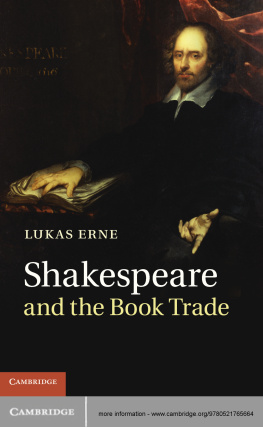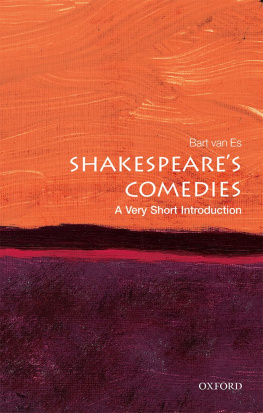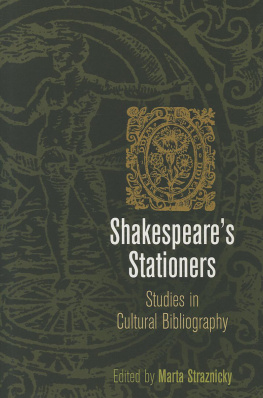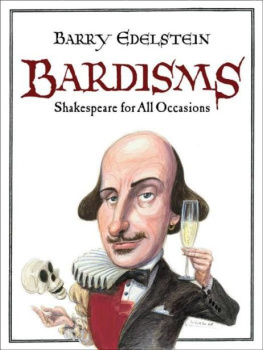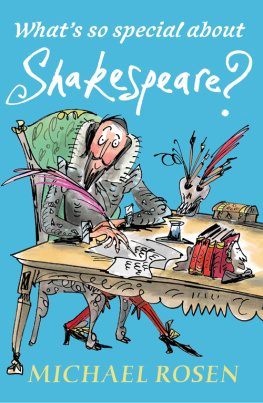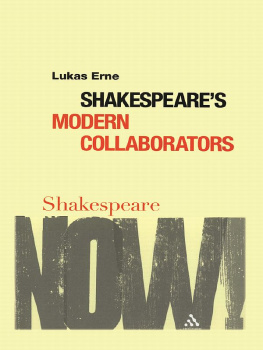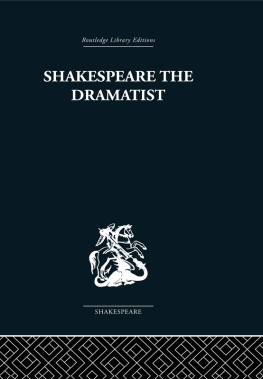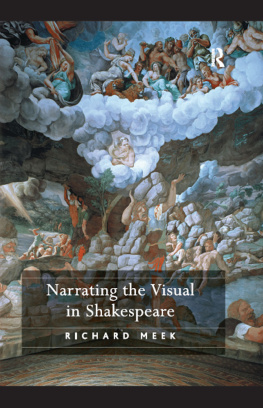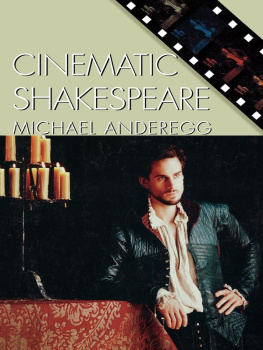
Shakespeare and the Book Trade
Shakespeare and the Book Trade follows on from Lukas Ernes groundbreaking Shakespeare as Literary Dramatist to examine the publication, constitution, dissemination and reception of Shakespeares printed plays and poems in his own time and to argue that their popularity in the book trade has been greatly underestimated. Erne uses evidence from Shakespeares publishers and the printed works to show that in the final years of the sixteenth century and the early part of the seventeenth century, Shakespeare became a name from which money could be made, a book trade commodity in which publishers had significant investments and an author who was bought, read, excerpted and collected on a surprising scale. Erne argues that Shakespeare, far from indifferent to his popularity in print, was an interested and complicit witness to his rise as a print-published author. Thanks to the book trade, Shakespeares authorial ambition started to become bibliographic reality during his lifetime.
LUKAS ERNE is Professor of English at the University of Geneva. Holding degrees from the Universities of Lausanne, Oxford and Geneva, he has taught at the University of Neuchtel and, as Visiting Professor, at Yale University. He has been the Fowler Hamilton Research Fellow at Christ Church, University of Oxford, and the recipient of research fellowships at the Folger Shakespeare Library and the Huntington Library. Erne is the author of Shakespeares Modern Collaborators (2008), Beyond The Spanish Tragedy: A Study of the Works of Thomas Kyd () and, with M. J. Kidnie, of Textual Performances: The Modern Reproduction of Shakespeares Drama (2004). He gave the Lyell Lectures, on Shakespeare and the Book Trade, at the University of Oxford in spring 2012.
Shakespeare and the Book Trade
Lukas Erne
University of Geneva
CAMBRIDGE UNIVERSITY PRESS
Cambridge, New York, Melbourne, Madrid, Cape Town, Singapore, So Paulo, Delhi, Mexico City
Cambridge University Press
The Edinburgh Building, Cambridge CB2 8RU, UK
Published in the United States of America by Cambridge University Press, New York
www.cambridge.org
Information on this title: www.cambridge.org/9780521765664
Cambridge University Press 2013
This publication is in copyright. Subject to statutory exception and to the provisions of relevant collective licensing agreements, no reproduction of any part may take place without the written permission of Cambridge University Press.
First published 2013
Printed and bound in the United Kingdom by the MPG Books Group
A catalogue record for this publication is available from the British Library
Library of Congress Cataloguing in Publication data
Erne, Lukas.
Shakespeare and the Book Trade / by Lukas Erne, University of Geneva.
pages cm
Includes bibliographical references and index.
ISBN 978-0-521-76566-4
1. Shakespeare, William, 15641616 Criticism, Textual. 2. Shakespeare, William,
15641616 Books and reading. 3. Shakespeare, William, 15641616 Influence. 4. Book
industries and trade England History 16th century. 5. Book industries and trade
England History 17th century. 6. Literature publishing England History 16th
century. 7. Literature publishing England History 17th century. I. Title.
PR3071.E74 2013
822.33dc23
2012039597
ISBN 978-0-521-76566-4 Hardback
Cambridge University Press has no responsibility for the persistence or accuracy of URLs for external or third-party internet websites referred to in this publication, and does not guarantee that any content on such websites is, or will remain, accurate or appropriate.
To
Katrin, Rebecca, Raphael and Miriam
Figures
Tables
Acknowledgements
Substantial parts of this monograph were presented as the Lyell Lectures in Bibliography at the University of Oxford in April and May 2012. I wish to thank Dr Sarah Thomas, Bodleys Librarian, and the Board of Lyell Electors, for their invitation and generosity. From January to June of the same year, while on research leave from the University of Geneva, I had the good fortune to occupy the position of Fowler Hamilton Research Fellow at Christ Church, Oxford, which allowed me to complete the typescript of this monograph in ideal conditions. I am deeply grateful to the Dean, the Very Reverend Christopher Lewis, and Students of Christ Church.
The Swiss National Research Foundation (SNRF) has generously supported my research and enabled me to hire several post-doctoral research assistants who helped my work in various ways, notably by compiling data on which my monograph draws. I thank Tamsin Badcoe, Antoinina Bevan-Zlatar, Johanna Harris, Sarah Van der Laan and Louise Wilson for their precious assistance. The scholars who have been supportive of my SNRF research project in various ways include Jonathan Bate, Claude Bourqui, Patrick Cheney, Neil Forsyth, Jean-Philippe Jaccard, Michel Jeanneret, John Jowett, M. J. Kidnie, Sonia Massai, Anthony Mortimer, Paul Schubert, Ann Thompson, Margaret Tudeau-Clayton and Richard Waswo. My research project has also benefited from financial support granted by the Socit acadmique, the Fondation Ernst et Lucie Schmidheiny and the Commission administrative, all of the University of Geneva.
I have presented various instalments of Shakespeare and the Book Trade as lectures at the University of Cambridge, the London Shakespeare Seminar, the University of St Andrews and the Shakespeare Institute of the University of Birmingham, at conferences at the University of Marburg and the Universities of Strasbourg and Mulhouse, and at the International Shakespeare Conference in Stratford-upon-Avon. I thank the generous hosts and organizers, in particular Anne Bandry, Jean-Jacques Chardin, Michael Dobson, Ewan Fernie, Sonja Fielitz, Lorna Hutson, John Jowett, Sonia Massai, Subha Mukherji, Andrew Murphy and Ann Thompson.
While my research towards Shakespeare and the Book Trade was in progress, I had fruitful conversations about my work with many friends and esteemed colleagues from whose ideas and insights I have benefited, notably with Michael Alexander, Kate Bennett, Guillemette Bolens, Colin Burrow, Katherine Duncan-Jones, Alan Farmer, Zachary Lesser, Rhodri Lewis, Raphael Lyne, Ian Maclean, Gordon McMullan, Sonia Massai, David Matthews, Robert Miola, Stephen Orgel, Richard Proudfoot, Tore Rem, David Spurr, Tiffany Stern, Bart Van Es and Paul Werstine. Those who have kindly answered queries related to my work include Joseph Black, Hugh Cahill, Janet Clare, Carol Conlin, Giles Mandelbrote, Thirza Mulder, Helen Powell, Amanda Saville, Martin Spinelli and Germaine Warkentin. Peter Blayney answered several queries and generously shared with me some of his vast knowledge of the early modern London book trade. Alan Farmer and Lawrence Manley kindly gave me access to typescripts of as yet unpublished work. Patrick Cheney has provided encouragement, stimulation and feedback throughout the writing of this book, and he has read and incisively commented on the entire typescript, as has Neil Forsyth, a continuous source of inspiration and support ever since my undergraduate days at the University of Lausanne. My heartfelt thanks to them all.

